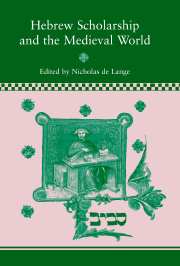Book contents
- Frontmatter
- Contents
- The contributors
- Preface
- List of abbreviations
- PART ONE NEW LINES OF INVESTIGATION
- PART TWO THE HEBREW LANGUAGE
- 5 The early eastern traditions of Hebrew grammar
- 6 Banner, miracle, trial? Medieval Hebrew lexicography between facts and faith
- 7 The knowledge and practice of Hebrew grammar among Christian scholars in pre-expulsion England: the evidence of ‘bilingual’ Hebrew–Latin manuscripts
- PART THREE PRAYER AND POETRY
- PART FOUR THE WORLD OUTSIDE
- Bibliography of the writings of Raphael Loewe
- Index of names
7 - The knowledge and practice of Hebrew grammar among Christian scholars in pre-expulsion England: the evidence of ‘bilingual’ Hebrew–Latin manuscripts
Published online by Cambridge University Press: 21 January 2010
- Frontmatter
- Contents
- The contributors
- Preface
- List of abbreviations
- PART ONE NEW LINES OF INVESTIGATION
- PART TWO THE HEBREW LANGUAGE
- 5 The early eastern traditions of Hebrew grammar
- 6 Banner, miracle, trial? Medieval Hebrew lexicography between facts and faith
- 7 The knowledge and practice of Hebrew grammar among Christian scholars in pre-expulsion England: the evidence of ‘bilingual’ Hebrew–Latin manuscripts
- PART THREE PRAYER AND POETRY
- PART FOUR THE WORLD OUTSIDE
- Bibliography of the writings of Raphael Loewe
- Index of names
Summary
In a pioneering study on bilingual Hebrew–Latin Bible codices from medieval England, Raphael Loewe highlighted a marked discrepancy between, on the one hand, the interest displayed by Christian scholars in the Hebrew Bible and its Jewish exegesis and, on the other hand, their lack of concern with methodical or structured descriptions of the Hebrew language itself. Indeed, it seems that no comprehensive treatise or textbook of Hebrew grammar was produced during the twelfth and the thirteenth centuries, a period of intensive Christian study of Hebrew sources. While they encountered a wide range of Hebrew texts, Christian scholars of the period do not seem to have displayed much interest in their purely linguistic or grammatical dimensions. The fact that a complex theory of Hebrew grammar was not developed by Christian scholars is understandable, given that Latin grammar itself was struggling at that time to acquire its status as a scientia. What is far more surprising, however, is that there existed virtually no pedagogical aids or manuals to assist to access the original texts.
So far as the twelfth century is concerned, this indifference to the study of the Hebrew language could be related to the well-known fact that Christian scholars of the time approached the Hebrew sources through competent Jewish teachers, with whom they interacted in the vernacular French.With notable exceptions, such as Herbert of Bosham (d. after 1190) who could study Rashi commentaries by himself, Christian scholars throughout the twelfth century had to call upon Jewish scholars or converts in their study of the Hebrew Bible and rabbinic literature.
- Type
- Chapter
- Information
- Hebrew Scholarship and the Medieval World , pp. 107 - 128Publisher: Cambridge University PressPrint publication year: 2001
- 5
- Cited by



